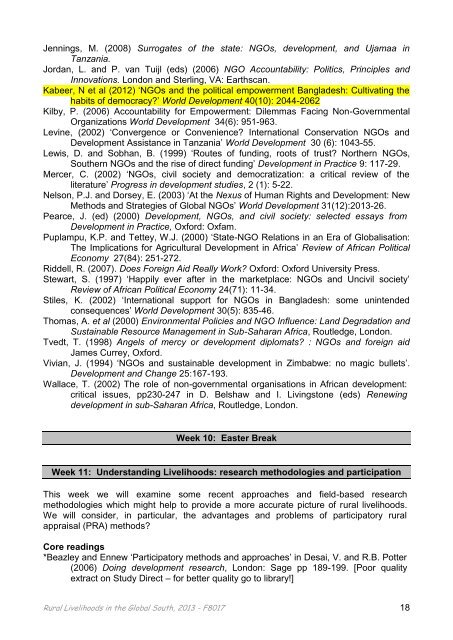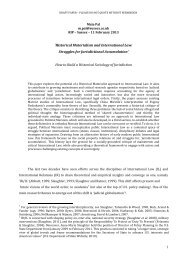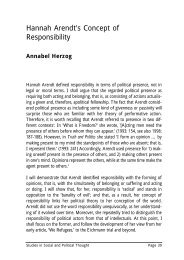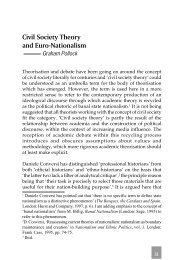rural livelihoods in the global south (f8017s) - University of Sussex
rural livelihoods in the global south (f8017s) - University of Sussex
rural livelihoods in the global south (f8017s) - University of Sussex
You also want an ePaper? Increase the reach of your titles
YUMPU automatically turns print PDFs into web optimized ePapers that Google loves.
Jenn<strong>in</strong>gs, M. (2008) Surrogates <strong>of</strong> <strong>the</strong> state: NGOs, development, and Ujamaa <strong>in</strong><br />
Tanzania.<br />
Jordan, L. and P. van Tuijl (eds) (2006) NGO Accountability: Politics, Pr<strong>in</strong>ciples and<br />
Innovations. London and Sterl<strong>in</strong>g, VA: Earthscan.<br />
Kabeer, N et al (2012) ‘NGOs and <strong>the</strong> political empowerment Bangladesh: Cultivat<strong>in</strong>g <strong>the</strong><br />
habits <strong>of</strong> democracy?’ World Development 40(10): 2044-2062<br />
Kilby, P. (2006) Accountability for Empowerment: Dilemmas Fac<strong>in</strong>g Non-Governmental<br />
Organizations World Development 34(6): 951-963.<br />
Lev<strong>in</strong>e, (2002) ‘Convergence or Convenience? International Conservation NGOs and<br />
Development Assistance <strong>in</strong> Tanzania’ World Development 30 (6): 1043-55.<br />
Lewis, D. and Sobhan, B. (1999) ‘Routes <strong>of</strong> fund<strong>in</strong>g, roots <strong>of</strong> trust? Nor<strong>the</strong>rn NGOs,<br />
Sou<strong>the</strong>rn NGOs and <strong>the</strong> rise <strong>of</strong> direct fund<strong>in</strong>g’ Development <strong>in</strong> Practice 9: 117-29.<br />
Mercer, C. (2002) ‘NGOs, civil society and democratization: a critical review <strong>of</strong> <strong>the</strong><br />
literature’ Progress <strong>in</strong> development studies, 2 (1): 5-22.<br />
Nelson, P.J. and Dorsey, E. (2003) ‘At <strong>the</strong> Nexus <strong>of</strong> Human Rights and Development: New<br />
Methods and Strategies <strong>of</strong> Global NGOs’ World Development 31(12):2013-26.<br />
Pearce, J. (ed) (2000) Development, NGOs, and civil society: selected essays from<br />
Development <strong>in</strong> Practice, Oxford: Oxfam.<br />
Puplampu, K.P. and Tettey, W.J. (2000) ‘State-NGO Relations <strong>in</strong> an Era <strong>of</strong> Globalisation:<br />
The Implications for Agricultural Development <strong>in</strong> Africa’ Review <strong>of</strong> African Political<br />
Economy 27(84): 251-272.<br />
Riddell, R. (2007). Does Foreign Aid Really Work? Oxford: Oxford <strong>University</strong> Press.<br />
Stewart, S. (1997) ‘Happily ever after <strong>in</strong> <strong>the</strong> marketplace: NGOs and Uncivil society’<br />
Review <strong>of</strong> African Political Economy 24(71): 11-34.<br />
Stiles, K. (2002) ‘International support for NGOs <strong>in</strong> Bangladesh: some un<strong>in</strong>tended<br />
consequences’ World Development 30(5): 835-46.<br />
Thomas, A. et al (2000) Environmental Policies and NGO Influence: Land Degradation and<br />
Susta<strong>in</strong>able Resource Management <strong>in</strong> Sub-Saharan Africa, Routledge, London.<br />
Tvedt, T. (1998) Angels <strong>of</strong> mercy or development diplomats? : NGOs and foreign aid<br />
James Currey, Oxford.<br />
Vivian, J. (1994) ‘NGOs and susta<strong>in</strong>able development <strong>in</strong> Zimbabwe: no magic bullets’.<br />
Development and Change 25:167-193.<br />
Wallace, T. (2002) The role <strong>of</strong> non-governmental organisations <strong>in</strong> African development:<br />
critical issues, pp230-247 <strong>in</strong> D. Belshaw and I. Liv<strong>in</strong>gstone (eds) Renew<strong>in</strong>g<br />
development <strong>in</strong> sub-Saharan Africa, Routledge, London.<br />
Week 10: Easter Break<br />
Week 11: Understand<strong>in</strong>g Livelihoods: research methodologies and participation<br />
This week we will exam<strong>in</strong>e some recent approaches and field-based research<br />
methodologies which might help to provide a more accurate picture <strong>of</strong> <strong>rural</strong> <strong>livelihoods</strong>.<br />
We will consider, <strong>in</strong> particular, <strong>the</strong> advantages and problems <strong>of</strong> participatory <strong>rural</strong><br />
appraisal (PRA) methods?<br />
Core read<strong>in</strong>gs<br />
*Beazley and Ennew ‘Participatory methods and approaches’ <strong>in</strong> Desai, V. and R.B. Potter<br />
(2006) Do<strong>in</strong>g development research, London: Sage pp 189-199. [Poor quality<br />
extract on Study Direct – for better quality go to library!]<br />
Rural Livelihoods <strong>in</strong> <strong>the</strong> Global South, 2013 - F8017 18
















